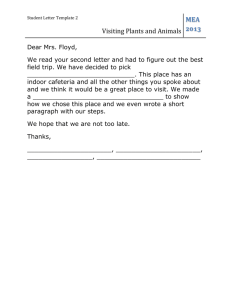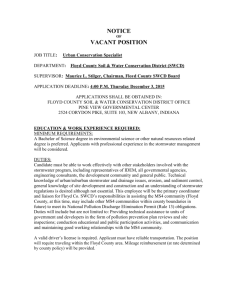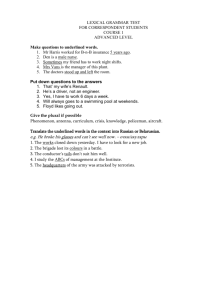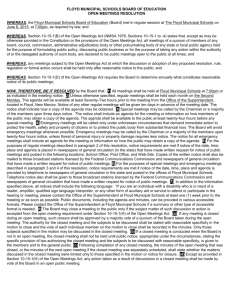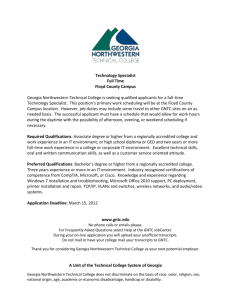Case Study – A Romp Through Comp
advertisement
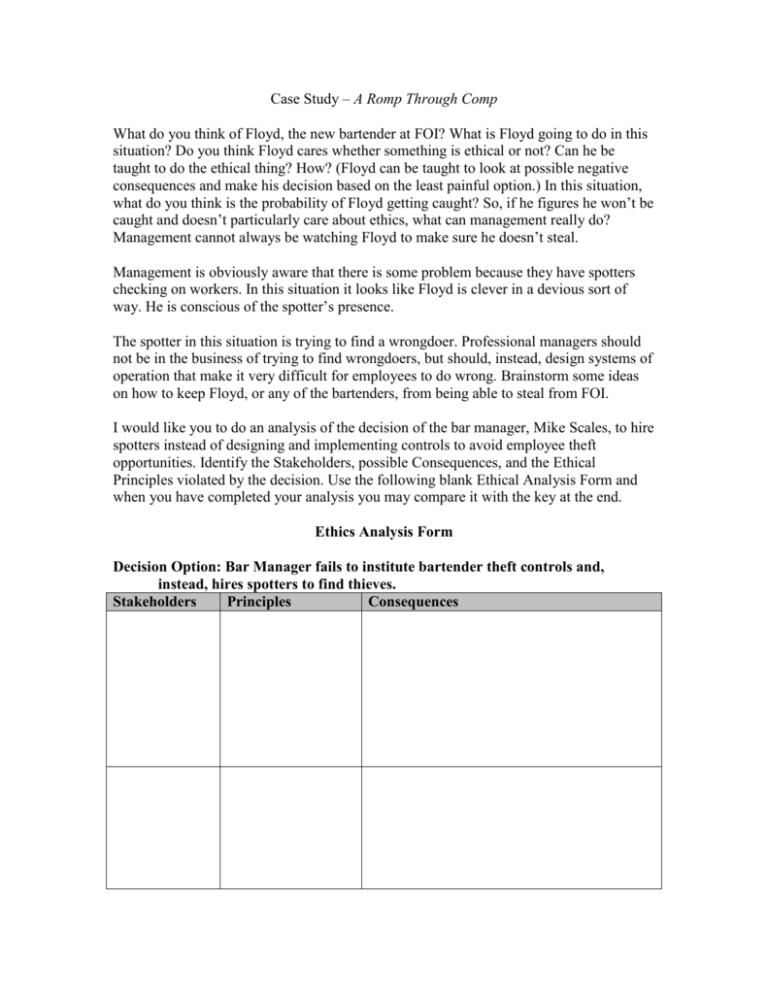
Case Study – A Romp Through Comp What do you think of Floyd, the new bartender at FOI? What is Floyd going to do in this situation? Do you think Floyd cares whether something is ethical or not? Can he be taught to do the ethical thing? How? (Floyd can be taught to look at possible negative consequences and make his decision based on the least painful option.) In this situation, what do you think is the probability of Floyd getting caught? So, if he figures he won’t be caught and doesn’t particularly care about ethics, what can management really do? Management cannot always be watching Floyd to make sure he doesn’t steal. Management is obviously aware that there is some problem because they have spotters checking on workers. In this situation it looks like Floyd is clever in a devious sort of way. He is conscious of the spotter’s presence. The spotter in this situation is trying to find a wrongdoer. Professional managers should not be in the business of trying to find wrongdoers, but should, instead, design systems of operation that make it very difficult for employees to do wrong. Brainstorm some ideas on how to keep Floyd, or any of the bartenders, from being able to steal from FOI. I would like you to do an analysis of the decision of the bar manager, Mike Scales, to hire spotters instead of designing and implementing controls to avoid employee theft opportunities. Identify the Stakeholders, possible Consequences, and the Ethical Principles violated by the decision. Use the following blank Ethical Analysis Form and when you have completed your analysis you may compare it with the key at the end. Ethics Analysis Form Decision Option: Bar Manager fails to institute bartender theft controls and, instead, hires spotters to find thieves. Stakeholders Principles Consequences This analysis makes it obvious that it is good and ethical management to design and implement controls in advance to keep employees from cheating or stealing. Also, careful selection of employees is essential. Floyd may not have been a good hire. Mike Scales may not have the management skills to be able to design and implement the necessary controls. He may need upper management’s help. Conclusion Many cost control issues are really human resources issues. Selecting appropriate employees who are not thieves, training and supervising our employees not to steal or waste product or time, and having controls in place that reduce the temptation to steal to begin with, are human resource management tasks that make cost control possible. Most of you have enough job experience to know the difference between good and bad management. We prefer managers who know what they are doing and do it the right way. We prefer managers who follow the rules and who are able to get all the employees following the rules too. We prefer feeling pride in our work and in the place we work. We prefer feeling good about what we do and the way we spend our time on the job. Ethical controls, that is, controls that are Fair and implemented with Concern and Respect for Others, combined with professional (ethical) supervision, increase the likelihood of our management success. Ethics Analysis Form A Romp Through Comp Decision Option: Bar Manager fails to institute bartender theft controls and, instead, hires spotters to find thieves. Stakeholders Principles Consequences KEY – Ethics Analysis Form A Romp Through Comp Decision Option: Bar Manager fails to institute bartender theft controls and, instead, hires spotters to find thieves. Stakeholders Principles Consequences Mike Scales, Fairness If a spotter witnesses a bartender Bar Manager Concern & Respect stealing, and the bartender is (Decision for others subsequently fired, other bartenders Maker) Commitment to will be more careful in the future to Excellence avoid getting caught. Theft won’t Leadership necessarily end, but it will occur less Reputation and often and be more difficult to spot. Morale If it is easy for bartenders to steal, they Accountability might not think about the consequences of getting caught. They will feel free to do as they please. The environment bartenders work in may be less respectful as spotters are camped out at the bar, watching for thievery. Theft and the hiring of spotters increase costs, which reduces profits. Mike is accountable for the profitability of his department and his position is at stake. Employees who steal have little respect for the managers who allow it to happen. Employees who don’t steal have little respect for the managers who allow other employees to steal. Employees may be less cooperative, morale may fall, and turnover may increase. Floyd If caught, Floyd will be fired. He will not have a good reference. If not caught, Floyd will continue to steal and may eventually be caught and terminated. Floyd has little respect for management or spotters. As he is allowed to continue stealing, he will have less respect. Other If they see Floyd getting away with it, Bartenders despite the presence of spotters, some bartenders may also be encouraged to steal. Other bartenders may not like it that Floyd is stealing, but they may be Heidi Bell, Asst. G.M. & Mike’s Supervisor FOI uncomfortable about informing on him. The working environment would be spoiled for them. Employees lose respect for managers who don’t do their jobs properly. They can be less satisfied and less loyal. If costs stay high, Mike’s work could come under his supervisor’s scrutiny. He could lose the confidence of upper management. He could even lose his job. On-going theft that is not taken care of puts Mike’s job in jeopardy. Mike was promoted and may not have the expertise to put proper controls in place. His boss, Heidi, is responsible for his work and may need to help him. The hiring of spotters increases operating costs. Internal checks and balances do not increase operating costs.
